- Trials and Tribulations. Innocence Matters?
- Forensic Pathology - Preventing Wrongs
- Bad Form - How tariffs protect the guilty and punish the innocent
- The Cardiff 5 - Innocent beyond any doubt (1st Ed.)
- The Cardiff 5 - Innocent beyond any doubt (2nd Ed.)
- Fitted In - The Cardiff 3 and the Lynette White Inquiry
Trials and Tribulations - Innocence Matters
In 2017 the former Home Secretary, Amber Rudd, announced that there would be no public inquiry into a very limited aspect of this notorious miscarriage case. Satish Sekar outlines the shameful way that despite clear evidence of innocence, the Cardiff Five were effectively prosecuted by the backdoor twice more without any safeguards. What does innocence, and its presumption, mean when even the conviction of the real murderer does not prevent re-prosecution without any burden of proof, and without any rights of redress? It boasts high calibre contributors, including top QC, Edward Fitzgerald, Police and Crime Commissioner for South Wales, Alun Michael, international justice advocate Jennifer Thompson, African icon and anti-death penalty injustice victim Mpagi Edward Edmary, pioneering anti-racist activist Dev Barrah and Cardiff solicitor Stuart Hutton.
Forensic Pathology - Preventing Wrongs
This book reveals the failure to utilise forensic pathology and other sciences and investigative techniques correctly. It contains important information on how the integrated approach to the investigation of homicides can prevent injustices, and deliver justice. Over a decade after this approach was adopted, it is amazing how little is known about it. It is the standard that investigations should be held to.
How tariffs protect the guilty and punish the innocent
Murderers sentenced to life imprisonment are given a tariff (the minimum they must serve before they can apply for parole). Bad Form blows the lid on a scandal that allowed real killers to be treated more leniently than the innocent had been for the same crime. Repeatedly, judges paid lip service to innocence, and then imposed tariffs that ignored the effects of miscarriages of justice on those proved innocent by the conviction of the real perpetrators. Bad Form shows that judges have the powers needed to ensure the punishment reflects the suffering of all the victims in these crimes, but have never used those powers for the innocent. Either the law is inadequate and must be changed, or judges are not using their powers to show that innocence matters. Bad Form details how tariffs protect the guilty and punish the innocent, taking the lid off a national scandal.
The Cardiff 5 - Innocent beyond any doubt (1st Ed.)
“This is one of the most important books ever written about criminal justice" - Micheal Mansfield
It would be easy to confine my remarks to the Cardiff Five case but this would be a disservice to the thrust of this narrative as well as its author. If anyone wants to know what has been going on, and going wrong, over the past half century spanning my entire professional career, here it is. Written with spell-binding passion alongside meticulous research and observation, Satish Sekar has accomplished what few others have achieved. It is redolent of those magnificent French films starring Yves Montand where one man takes on the state in the pursuit of truth and justice – and succeeds.
The Cardiff 5 - Innocent beyond any doubt (2nd Ed.)
This fresh edition of Satish Sekar’s classic work brings events up to date as at 2017 and includes matters that the author was prevented from publishing sooner. Among other things it deals with the collapse of the 2011 trial of police officers and others concerning the original miscarriage of justice in this case and in a new Epilogue calls for a Truth and Justice Commission. The author shows how this extreme miscarriage of justice destroyed families, divided communities and undermined confidence in the criminal justice system. The book takes the reader from the sadistic killing of Lynette White in Cardiff in 1988, via the subsequent investigation and trial to the aftermath of the folding of the 2011 trial over ‘lost’ documents that later materialised. But above all, it deals with the hard scientific facts of the first vindication case of the DNA-age.
The Cardiff 3 and the Lynette White Inquiry
It takes a shocking case to alter the public’s appreciation and understanding of what happens to defendants every day of the week. There was probably nothing in the case against the original five defendants in Cardiff that does not happen daily. The investigation involved the police having a clear idea and the resources to prove it of the likely murderer of Lynette White. He had all the hallmarks of a single killer affected by deep psychological problems with a battery of distinctive psychiatric features and a history of violence which could not have been contained for his entire life and, in addition, was probably a client of Lynette’s.
Instead, ...
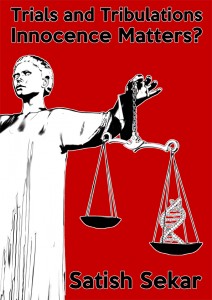
In 2017 the former Home Secretary, Amber Rudd, announced that there would be no public inquiry into a very limited aspect of this notorious miscarriage case. Satish Sekar outlines the shameful way that despite clear evidence of innocence, the Cardiff Five were effectively prosecuted by the backdoor twice more without any safeguards. What does innocence, and its presumption, mean when even the conviction of the real murderer does not prevent re-prosecution without any burden of proof, and without any rights of redress? .
It boasts high calibre contributors, including top QC, Edward Fitzgerald, Police and Crime Commissioner for South Wales, Alun Michael, international justice advocate Jennifer Thompson, African icon and anti-death penalty injustice victim Mpagi Edward Edmary, pioneering anti-racist activist Dev Barrah and Cardiff solicitor Stuart Hutton.

This book reveals the failure to utilise forensic pathology and other sciences and investigative techniques correctly. It contains important information on how the integrated approach to the investigation of homicides can prevent injustices, and deliver justice. Over a decade after this approach was adopted, it is amazing how little is known about it. It is the standard that investigations should be held to.
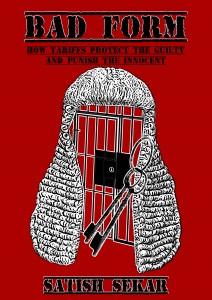
Murderers sentenced to life imprisonment are given a tariff (the minimum they must serve before they can apply for parole). Bad Form blows the lid on a scandal that allowed real killers to be treated more leniently than the innocent had been for the same crime. Repeatedly, judges paid lip service to innocence, and then imposed tariffs that ignored the effects of miscarriages of justice on those proved innocent by the conviction of the real perpetrators. Bad Form shows that judges have the powers needed to ensure the punishment reflects the suffering of all the victims in these crimes, but have never used those powers for the innocent. Either the law is inadequate and must be changed, or judges are not using their powers to show that innocence matters. Bad Form details how tariffs protect the guilty and punish the innocent, taking the lid off a national scandal which has reulted in the real killer of Lynette White being awarded release without his other victims (the Cardiff Five and their families) being heard by the Parole Board at all, or being recognised as victims of Gafoor's conduct.
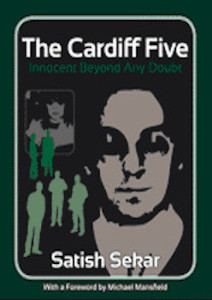
"This is one of the most important books ever written about criminal justice" - Micheal Mansfield
It would be easy to confine my remarks to the Cardiff Five case but this would be a disservice to the thrust of this narrative as well as its author. If anyone wants to know what has been going on, and going wrong, over the past half century spanning my entire professional career, here it is. Written with spell-binding passion alongside meticulous research and observation, Satish Sekar has accomplished what few others have achieved. It is redolent of those magnificent French films starring Yves Montand where one man takes on the state in the pursuit of truth and justice – and succeeds.
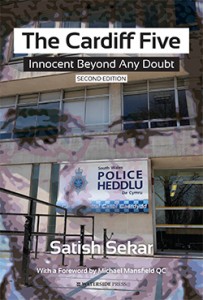
This fresh edition of Satish Sekar’s classic work brings events up to date as at 2017 and includes matters that the author was prevented from publishing sooner. Among other things it deals with the collapse of the 2011 trial of police officers and others concerning the original miscarriage of justice in this case and in a new Epilogue calls for a Truth and Justice Commission. The author shows how this extreme miscarriage of justice destroyed families, divided communities and undermined confidence in the criminal justice system. The book takes the reader from the sadistic killing of Lynette White in Cardiff in 1988, via the subsequent investigation and trial to the aftermath of the folding of the 2011 trial over ‘lost’ documents that later materialised. But above all, it deals with the hard scientific facts of the first vindication case of the DNA-age.
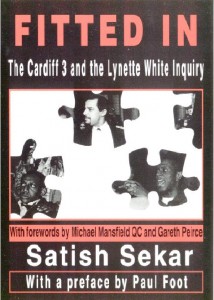
It takes a shocking case to alter the public’s appreciation and understanding of what happens to defendants every day of the week. There was probably nothing in the case against the original five defendants in Cardiff that does not happen daily. The investigation involved the police having a clear idea and the resources to prove it of the likely murderer of Lynette White. He had all the hallmarks of a single killer affected by deep psychological problems with a battery of distinctive psychiatric features and a history of violence which could not have been contained for his entire life and, in addition, was probably a client of Lynette’s. Instead, ...
